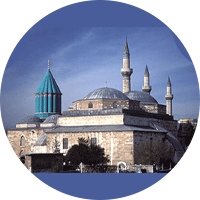Fihi Ma Fihi, Majlis No. 66 :-
Interesting Fact
Discourses of Jalaluddin Rumi by Sultan-ud-Daula
Serajuddin said: “I was speaking to someone about a problem when something within me began to ache.”
Rumi said: That something is put in charge of you to prevent you from speaking when you should not speak. Usually it is so subtle that it goes unnoticed, but when you feel that yearning, compulsion and pain, then you know there is something in control. For instance, you enter a pool of water and the softness of the flowers and fragrant herbs reach you, but when you get to the other side thorns prick you. Then you realize that one side is a thorn-bed and pain, while the other side is a flowerbed and comfort. These
differences affect us through our emotions, yet they are closer to us than anything external.
Hunger and thirst, anger and happiness—all these are invisible, yet they affect us more than anything we can see. For if you close your eyes, you can no longer see the perceptible, but this will not drive hunger away. In the same way, spice in hot dishes, sweetness and bitterness in foods, these cannot be seen, yet their taste has a much stronger effect upon us than how the food looks.
Why do you worry about this body? Why are you so attached to it? You live without it. You are always without it. When nighttime comes you forget it, but once the day arrives you are absorbed in your body’s affairs. But you are never truly with the body, so why tremble over its concerns. You are not with it for a single hour, but are always elsewhere. Where are you, and where is the body?
“You are in one valley, and I am in another.”
This body is a great deception.
Pharaoh’s magicians paused for an instant, like a speck of dust hanging in the air, and gave up their forms, for they knew they lived apart from the body, and the body was not them. In the same way, Abraham, Ishmael and all the prophets and saints, having paused, were indifferent to whether the body existed or not.
Hajjaaj, who smoked hashish, once shouted, “Do not move the door or my head will fall off!”
He thought his head was disconnected from his body and stayed in place only through its connection to the door. It is the same with all people— we think we are connected with the body and depend upon it for survival.
Serajuddin said: “I was speaking to someone about a problem when something within me began to ache.”
Rumi said: That something is put in charge of you to prevent you from speaking when you should not speak. Usually it is so subtle that it goes unnoticed, but when you feel that yearning, compulsion and pain, then you know there is something in control. For instance, you enter a pool of water and the softness of the flowers and fragrant herbs reach you, but when you get to the other side thorns prick you. Then you realize that one side is a thorn-bed and pain, while the other side is a flowerbed and comfort. These
differences affect us through our emotions, yet they are closer to us than anything external.
Hunger and thirst, anger and happiness—all these are invisible, yet they affect us more than anything we can see. For if you close your eyes, you can no longer see the perceptible, but this will not drive hunger away. In the same way, spice in hot dishes, sweetness and bitterness in foods, these cannot be seen, yet their taste has a much stronger effect upon us than how the food looks.
Why do you worry about this body? Why are you so attached to it? You live without it. You are always without it. When nighttime comes you forget it, but once the day arrives you are absorbed in your body’s affairs. But you are never truly with the body, so why tremble over its concerns. You are not with it for a single hour, but are always elsewhere. Where are you, and where is the body?
“You are in one valley, and I am in another.”
This body is a great deception.
Pharaoh’s magicians paused for an instant, like a speck of dust hanging in the air, and gave up their forms, for they knew they lived apart from the body, and the body was not them. In the same way, Abraham, Ishmael and all the prophets and saints, having paused, were indifferent to whether the body existed or not.
Hajjaaj, who smoked hashish, once shouted, “Do not move the door or my head will fall off!”
He thought his head was disconnected from his body and stayed in place only through its connection to the door. It is the same with all people— we think we are connected with the body and depend upon it for survival.
Additional information available
Click on the INTERESTING button to view additional information associated with this sher.
About this sher
rare Unpublished content
This ghazal contains ashaar not published in the public domain. These are marked by a red line on the left.

